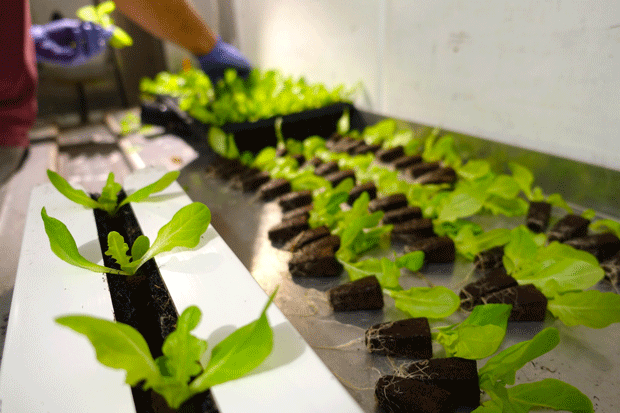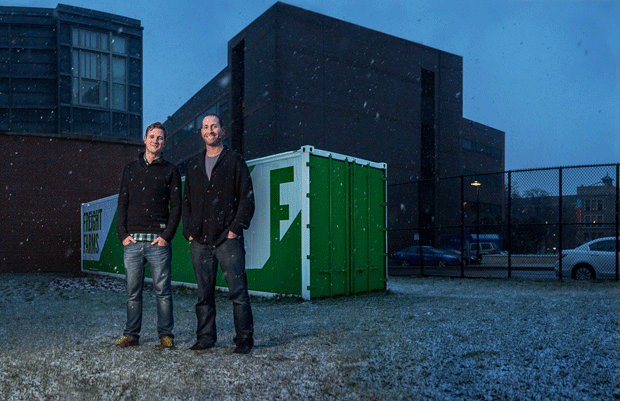How to shrink the family farm so it fits in a box
The future of farming is connected, sustainable and fits in a shipping container. At least that's what several startups around the country are hoping as they pack the tools for growing crops in a box along with lights, sensors and software in shipping containers to bring a new style of farming to urban areas.
The Ritz Carlton in Naples, Florida, has one. Boston Latin High School has one. At least two are in Anchorage, Alaska.
You can see the future of farming in several places around the country. A few miles from Atlanta's airport is a cluster of 100 shipping containers where each container can produce four tons of lettuce annually. The company that put the containers there is trying to take urban farming, the Internet of things and the trend toward eating local to the next level by helping startups stuff containers with everything an aspiring farmer needs and shipping it off.
PodPonics, the Atlanta-based company, is six years old and doesn't just operate the Atlanta containers. It takes the experience it has gleaned from its Atlanta efforts and makes software for running a container farm to sell to others.
Another provider, called Vertical Harvest Hydroponics, is selling shipping containers to Alaska so restaurants can grow lettuce themselves in the rugged climate, where shipping costs can make fresh greens an expensive delicacy.
Vertical Harvest Hydroponics is just one of the new farms-in-a-box startups that are popping up. Boston-based Freight Farms is also selling a 40-foot-by-8-foot farming container. It raised $3.7 million in funding in 2014, and it has scored several clients among urban farmers, school districts and even restaurateurs.
Jon Friedman, the president and co-founder, explained that the idea was to bring greens to Boston in the dead of winter. It also shortens the amount of time farmers have to spend toiling in the fields. The automation provided by the sensors and software that come in one of the company's $82,000 shipping containers is enough to let a farmer work for roughly two hours a day in each one. In comparison, to produce the equivalent crops before, he would have to spend 15 hours.
Machines handle the rest. They provide automated irrigation, the ability to assess the quality of the growing medium and regular lighting conditions to raise healthy plants. (Most pods don't use soil, and instead deliver the plants' nutrients through water.) By combining automation with software in the cloud, these containers are able to turn a novice into a capable farmer by virtue of an app.
Friedman said providing the water and electricity for the farm costs less than $20,000 a year, allowing farmers to produce about 1,000 heads of lettuce a week. Depending on location and the season, the lettuce can range from $2 to $6 a head. Friedman is capitalizing on several trends including a renewed focus from consumers on organic and local foods.
He's also trying to make farming into something cool. People can buy a Leafy Green Machine, which is the name of the container, and start a side business growing greens. Freight Farms has sold over 100 of Leafy Green Machines so far since producing the first one in 2013.
That's helping bring food production to younger generations who have been leaving traditional farms. Friedman is even thinking about developing a package for people who want to grow marijuana, although that's not a plant that grows well vertically.
It's not all hippies and people in the colder parts of the country. The Ritz-Carlton Beach Resort of Naples has a container farm on-site where it grows its own leafy greens for the hotel's restaurant.
But container farming in schools and in urban areas isn't going to solve the looming food crisis. Around the world, climate change, the economic hardships of farming and demands for natural foods have inspired another kind of farm in a box. This style of farming is just as automated, and everything you need to build a tech-heavy farm is inside the solar-powered container. The only difference is it's designed to travel to a two-acre field and monitor the crops outdoors.
Brandi DeCarli, the founding partner at Farm From A Box, which is making this solar-powered mission control for future farms, said the goal is to let farmers with smaller plots farm them more efficiently. It also widens the range of foods that a farm can produce. Right now, DeCarli hopes to ship her containers to refugee camps or communities where fresh food is hard to find and people may not be accustomed to growing their own food.
Technology won't solve all of the world's problems, but these startups are hoping it can at least help provide more people with fresh produce.

